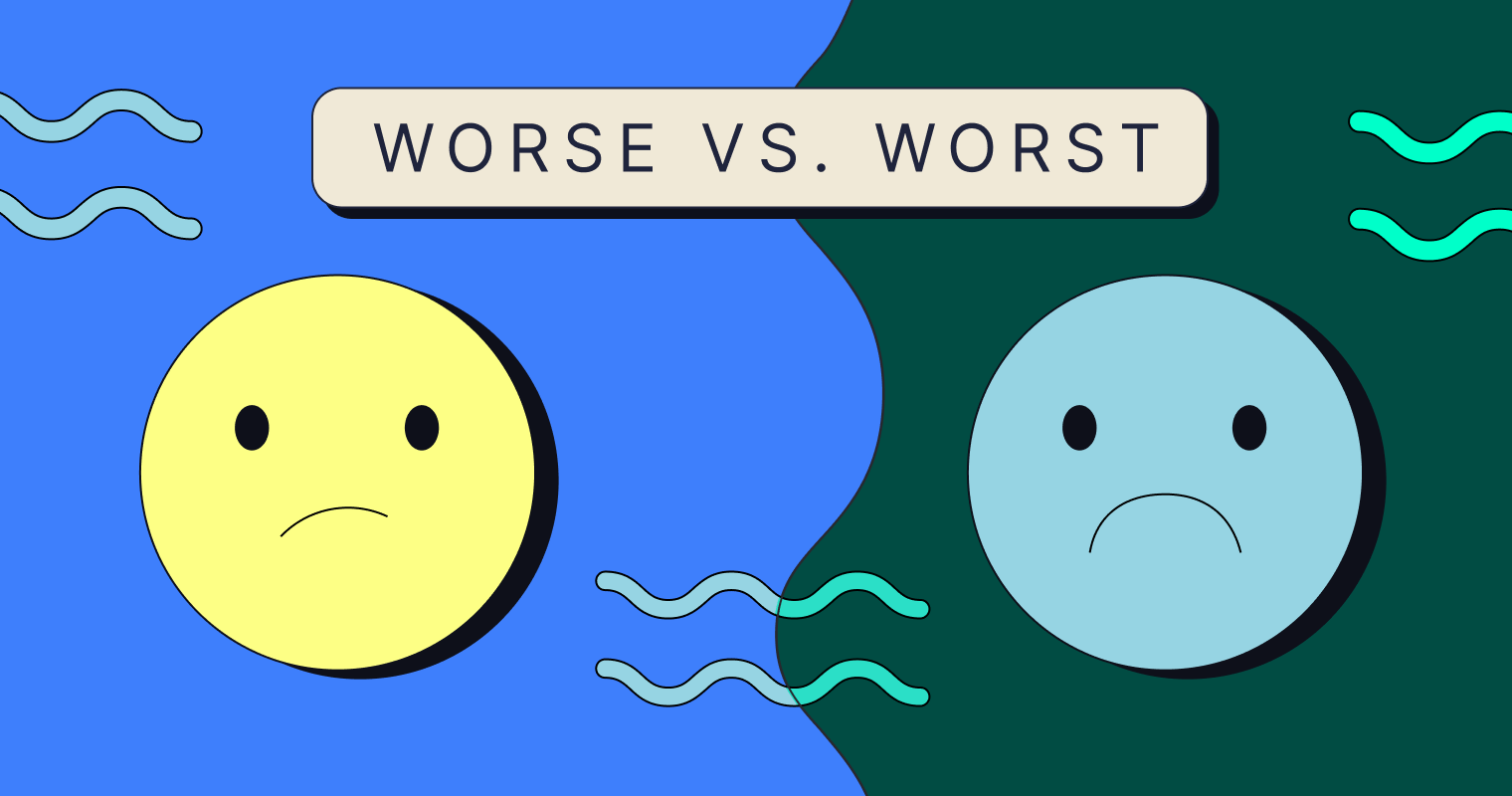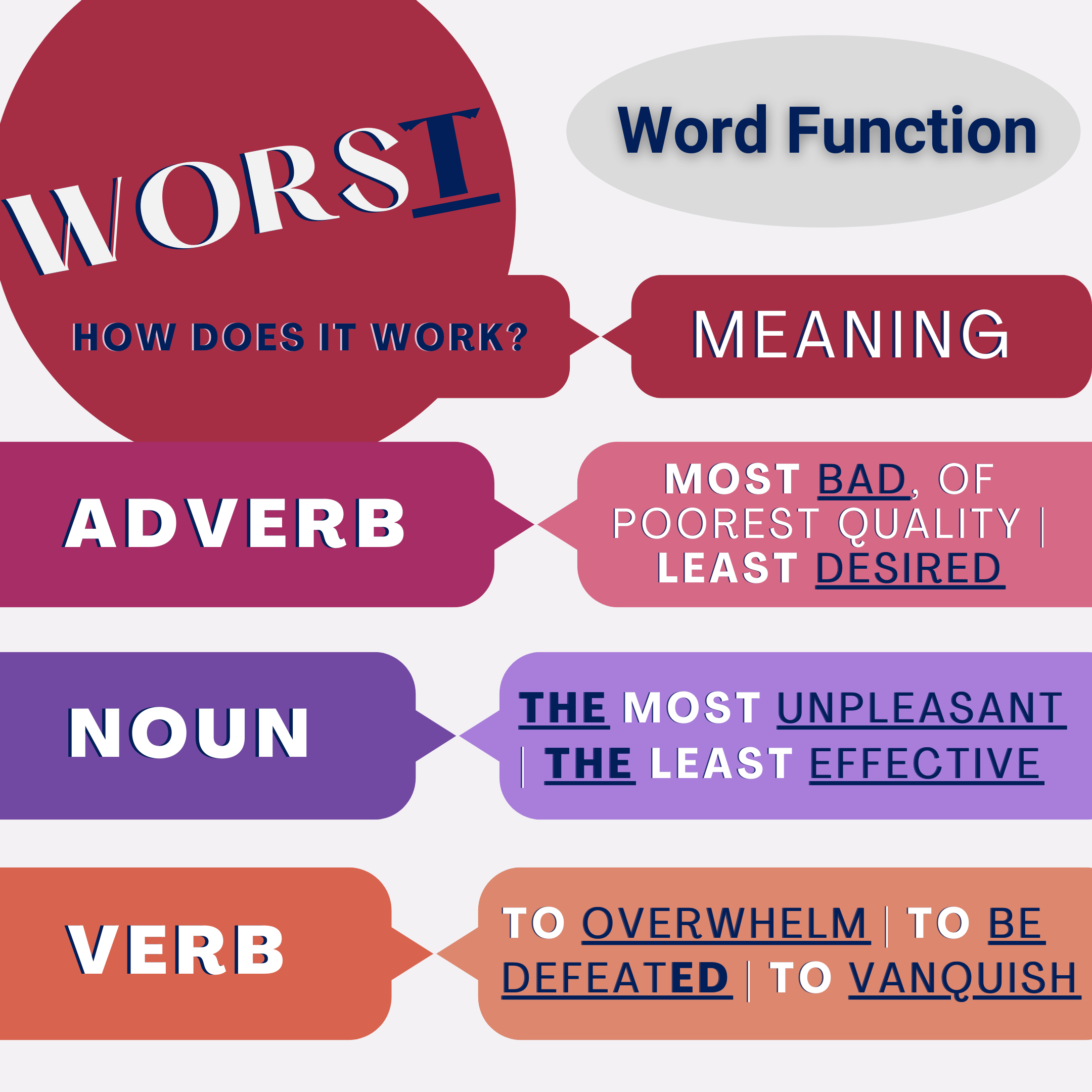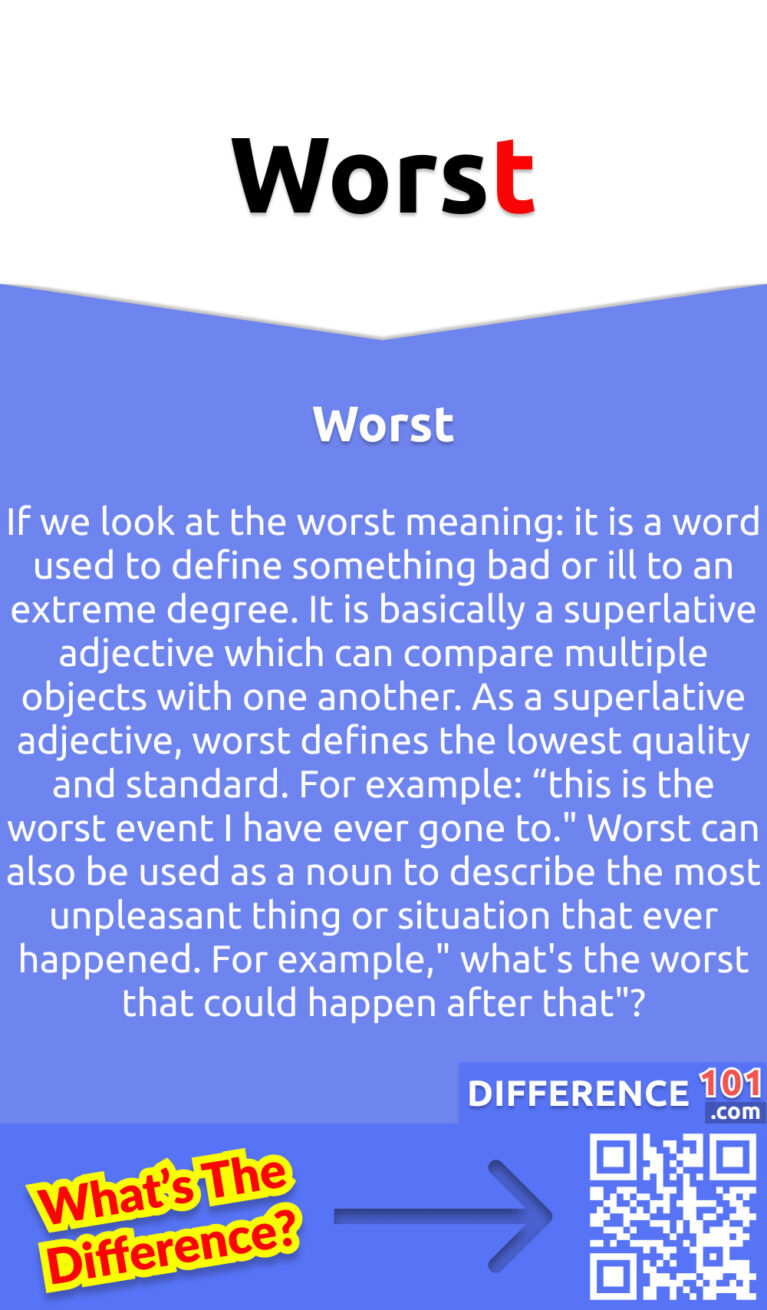Finding The "Worst College In America": What To Really Look For
Thinking about college can feel like a huge step, and honestly, figuring out where to go is a big deal for many people. You're probably wondering, like so many others, what is the worst college in America, and more importantly, how do you avoid ending up there? It's a question that gets a lot of folks talking, and it's a very practical one, too, given the time and money involved in higher education.
When we talk about something being "worst," it's not just a casual remark; it actually points to something being of the lowest quality, or the most unpleasant, difficult, or severe, as my text puts it. It really means "most bad" or "most inferior," like the least good option available. So, when applying this idea to a college, we are considering institutions that, in some respects, truly offer the least favorable outcome for students, which is pretty important to think about.
This discussion isn't about pointing fingers at specific schools, because that would be rather unfair and often misleading. Instead, we're going to explore the characteristics that can make a college a poor choice, helping you understand the signs of a less-than-ideal educational environment. You know, it's about empowering you with the knowledge to make a sound decision for your own future, which is something we all want, naturally.
- Sunglasses Tycoon Leonardo Del Vecchio Was Abandoned As A Child To An Orphanage Today Hes Worth 26 Billion
- He Grew Up Penniless And Nomadic And Then Found Out He Was The Heir To A 65 Million Estate
Table of Contents
- What Does "Worst" Really Mean for a College?
- Common Red Flags to Watch Out For
- How to Research Colleges Effectively
- People Also Ask
What Does "Worst" Really Mean for a College?
When we use the word "worst" to describe a college, we're really getting at the idea of something being the least beneficial or most detrimental to a student's academic journey and future prospects. It's not just about a bad feeling; it's about tangible shortcomings. My text suggests that "worst" refers to something of the lowest quality, degree, or standard among others in a particular category, and it points to the most unfavorable circumstances. So, for a college, this means considering what makes an institution genuinely inferior or truly unhelpful for its students, you know?
Understanding the Term "Worst"
The term "worst" is a superlative, which means it describes something that is "most bad" or "most inferior," as my text explains. It's the ultimate negative comparison. For example, the worst storm we had last winter knocked down our power lines, meaning it was the most severe. Applied to education, the worst college would be the one that offers the least good experience, the most inferior learning environment, or perhaps the most negative circumstances for its students. This could be due to a lack of resources, poor teaching, or maybe even predatory practices, which is something to consider, really.
It's important to remember that "worst" isn't always the same for everyone, though. What might be the "worst" fit for one person, perhaps due to a specific program they need, might not be the "worst" for another. However, there are some universal indicators of a truly low-quality institution that almost everyone would agree are problematic. These are the kinds of things that make a college broadly unhelpful or even harmful, so it's worth thinking about these broader implications, too.
- Inside 340 Million Deal Fernando Tatis Jr
- Los Angeles Is Home To The Largest And Most Expensive Residence In The World
Why Defining "Worst" Is Tricky
Defining the "worst" college is quite tricky, actually, because there isn't one single list or official ranking that labels a school as such. Unlike a list of "best" colleges, which often use metrics like reputation, selectivity, or alumni giving, identifying the "worst" involves looking at what truly fails students. It's more about identifying severe deficiencies rather than just lower scores on a typical ranking system. So, it's a bit more nuanced than simply picking the bottom of a published list, you know?
Many factors can contribute to a college being considered "worst," and these factors often overlap. For instance, a college with very poor academic outcomes might also have a history of financial instability, or maybe a lack of student support services. It's a combination of issues that can make an institution truly detrimental to a student's future. We're talking about a place where, at worst, your investment in education might not pay off, and that's a serious concern for anyone, really.
Common Red Flags to Watch Out For
When you're trying to figure out what might make a college less than ideal, there are some very clear signs, or "red flags," that you should definitely pay attention to. These are the kinds of things that often indicate a school is struggling to provide a valuable education or support its students effectively. It's like, if you see several of these, you might want to consider other options, naturally.
Concerning Accreditation Status
One of the most critical indicators of a college's quality is its accreditation status. Accreditation means that an independent body has reviewed the institution and determined that it meets certain standards of quality. If a college isn't accredited by a recognized agency, or if its accreditation is probationary, that's a huge problem. Degrees from unaccredited schools are often not recognized by employers or other universities, which can really limit your future opportunities. So, this is a very, very big deal to check, honestly.
You know, some places might claim to be "accredited" by obscure or unrecognized agencies. It's really important to verify that the accrediting body is legitimate and recognized by the U.S. Department of Education or the Council for Higher Education Accreditation (CHEA). If you can't find clear, verifiable information about a college's accreditation, or if it seems suspicious, that's a very strong sign to be cautious. It's like a warning sign that says, "look closer," you know?
Troubling Graduation and Retention Rates
A college's graduation rate tells you what percentage of its students actually finish their degrees within a reasonable timeframe, typically six years for a four-year program. A very low graduation rate can suggest that students aren't succeeding, perhaps due to a lack of support, poor academic programs, or maybe financial issues. Similarly, retention rates show how many first-year students return for their second year. If many students leave after their first year, it might indicate dissatisfaction with the school or its offerings. These numbers are pretty telling, you know, about the student experience.
You want to see schools where students are sticking around and actually completing their studies. Low rates could mean that students are finding the education to be of the lowest quality, or maybe the support systems are just not there for them. It's like, if everyone is leaving, there's probably a reason, right? So, checking these figures can give you a really good sense of how well a college supports its students through to completion, which is important.
Excessive Student Loan Debt and Poor Job Outcomes
For many, the point of college is to improve career prospects and earning potential. If graduates from a particular institution consistently leave with very high student loan debt but struggle to find relevant employment or earn a decent salary, that's a major concern. This suggests that the education might not be providing good value for the money, or that the career services are ineffective. It's like, you don't want to invest all that money just to be worse off financially, you know?
You can often find data on graduate earnings and debt levels through government websites or college scorecards. If a significant number of former students are defaulting on their loans, or if their average earnings are very low compared to the cost of attendance, it's a strong indicator that the college might be a financially risky choice. This is where the term "worst" really comes into play for your personal finances, meaning the least favorable outcome for your investment, arguably.
Unsupportive Student Services
A good college provides a robust network of support services, including academic advising, career counseling, mental health services, and tutoring. If a college has very limited or poor-quality student services, it can make it much harder for students to succeed, especially if they encounter challenges. It's like, if you need help, you want to know it's available, right? A lack of support can really make a college experience unpleasant, or even difficult, for students, you know.
You might be able to gauge the quality of these services by visiting the campus, if possible, or by reading reviews from current and former students. If students consistently complain about not being able to get appointments with advisors, or about inadequate mental health support, that's a pretty clear sign of an unsupportive environment. This kind of situation can easily lead to a less-than-ideal academic experience, which is something to think about, seriously.
Questionable Faculty Qualifications and Availability
The quality of your professors has a huge impact on your learning experience. If a college primarily employs adjunct instructors with little experience, or if full-time faculty are rarely available to students, that can be a major problem. You want to learn from knowledgeable, engaged educators who are accessible for questions and guidance. It's like, the people teaching you should really know their stuff, and be there for you, too, you know?
Look for information about faculty credentials and student-to-faculty ratios. If class sizes are enormous and professors seem to be spread very thin, it might mean you won't get the personalized attention you need to truly thrive. This kind of situation can make the learning experience feel very impersonal and, in some respects, quite ineffective, which is a concern for any student, really.
Limited or Outdated Resources
Modern education requires access to up-to-date resources, including well-stocked libraries, functional labs, reliable technology, and comfortable study spaces. A college with very limited or outdated resources can hinder your ability to learn effectively and conduct necessary research. It's like trying to build something without the right tools; it's just much harder, you know?
You might notice this during a campus visit, or by looking at photos and descriptions on the college's website. If facilities look neglected, or if there are constant complaints about broken equipment or slow internet, that's a pretty clear sign of a lack of investment in the student experience. This can make the college experience feel, in a way, like it's of the lowest quality, which is not what you want, obviously.
A History of Controversies or Legal Issues
Sometimes, a college might have a history of serious controversies, such as widespread cheating scandals, financial mismanagement, or even lawsuits related to student safety or deceptive practices. These kinds of issues can indicate deep-seated problems within the institution's leadership or culture. It's like, if there's a lot of bad news constantly coming out, that's a big warning sign, naturally.
A quick online search for news articles or public records related to the college can often reveal such issues. If you find multiple reports of significant problems, it's probably best to steer clear. This is where "worst" could mean "most corrupt" or "most ill," as my text points out, referring to the institution itself. You really want to avoid getting caught up in that kind of situation, for sure.
How to Research Colleges Effectively
Finding a college that's a good fit for you means doing some serious homework, and honestly, it's more than just looking at glossy brochures. You really need to dig into the details to make an informed choice and avoid any potential pitfalls. It's about being proactive in your search, which is something you'll appreciate later, you know.
Looking Beyond the Brochure
College brochures and websites are designed to present the school in the best possible light, which is fair enough. However, you need to look past the pretty pictures and enthusiastic descriptions. Try to find out what everyday life is truly like for students. Are there enough classes available? Is the campus safe and welcoming? What's the general feeling among students? These are the kinds of questions that really matter, you know.
Consider visiting the campus if you can, and if not, look for virtual tours that offer a comprehensive view of the facilities. Pay attention to the details: are the buildings well-maintained? Do students seem happy and engaged? Sometimes, just getting a feel for the atmosphere can tell you a lot more than any official marketing material, which is pretty useful, actually.
Gathering Student Perspectives
One of the best ways to understand a college's true nature is to hear directly from current and former students. They can offer insights into the academic rigor, social life, faculty quality, and student support that you won't find anywhere else. Their experiences can really highlight the good, the bad, and the truly unpleasant aspects of a school. So, listening to them is a really smart move, you know.
Look for student reviews on independent college review sites, or try to connect with alumni through professional networking platforms. If you know anyone who attended the school, reach out to them. Ask specific questions about their biggest challenges and their most positive experiences. Their honest feedback can be incredibly valuable in helping you decide if a college is a good fit, or perhaps, a very poor one, naturally.
Checking Official Data Sources
Beyond personal anecdotes, there's a wealth of official data available that can help you evaluate colleges objectively. Government websites, like the U.S. Department of Education's College Scorecard, provide information on costs, graduation rates, student debt, and post-graduation earnings. These are factual numbers that can paint a very clear picture of a school's performance. It's like, these numbers don't lie, you know?
Additionally, accreditation bodies often have public directories where you can verify a school's accreditation status. Looking at these official sources helps you cut through marketing hype and get down to the hard facts. This kind of thorough research is your best defense against making a choice that might turn out to be the least good for you, in some respects, which is what we want to avoid, obviously.
You can learn more about college evaluation on our site, and also explore tips for finding the right fit by linking to this page here.
People Also Ask
What are the signs of a bad college experience?
A bad college experience often includes feeling unsupported by staff, struggling to get into required classes, consistently encountering unhelpful professors, or finding that the campus environment feels unsafe or unwelcoming. It's like, if you're constantly feeling frustrated or neglected, that's a pretty strong sign something isn't right, you know.
How can I tell if a college is a scam?
You can often tell if a college is a scam if it promises guaranteed jobs, pressures you to enroll immediately, has very high tuition fees for a questionable degree, lacks proper accreditation, or makes it very difficult to get information about their programs or faculty. If something feels too good to be true, or if they're very pushy, it's probably a major red flag, seriously.
Is a low graduation rate always a bad sign?
While a low graduation rate is often a concerning sign, it's not always the sole indicator of a "bad" college. Sometimes, a low rate might be due to a specific student population, like a large number of part-time students or those who transfer out to other institutions. However, it definitely warrants further investigation to understand the underlying reasons, which is pretty important, you know.
When you're looking at colleges, understanding what makes an institution less than ideal is just as important as knowing what makes one great. By paying attention to accreditation, student outcomes, available resources, and the overall campus culture, you can make a more informed decision. It's about empowering yourself with knowledge to choose a path that genuinely supports your goals, rather than one that might lead to disappointment. For further information, you might check out resources from the National Center for Education Statistics, which is a very reliable source, naturally.
- If Blackberry Stock Stays Above 30 For 10 Days The Ceo Will Get A 90 Million Bonus
- Florence Ballard Net Worth

301 Moved Permanently

worse vs worst what is the difference?

Worse vs. Worst: 7 Key Differences, Pros & Cons, Examples | Difference 101